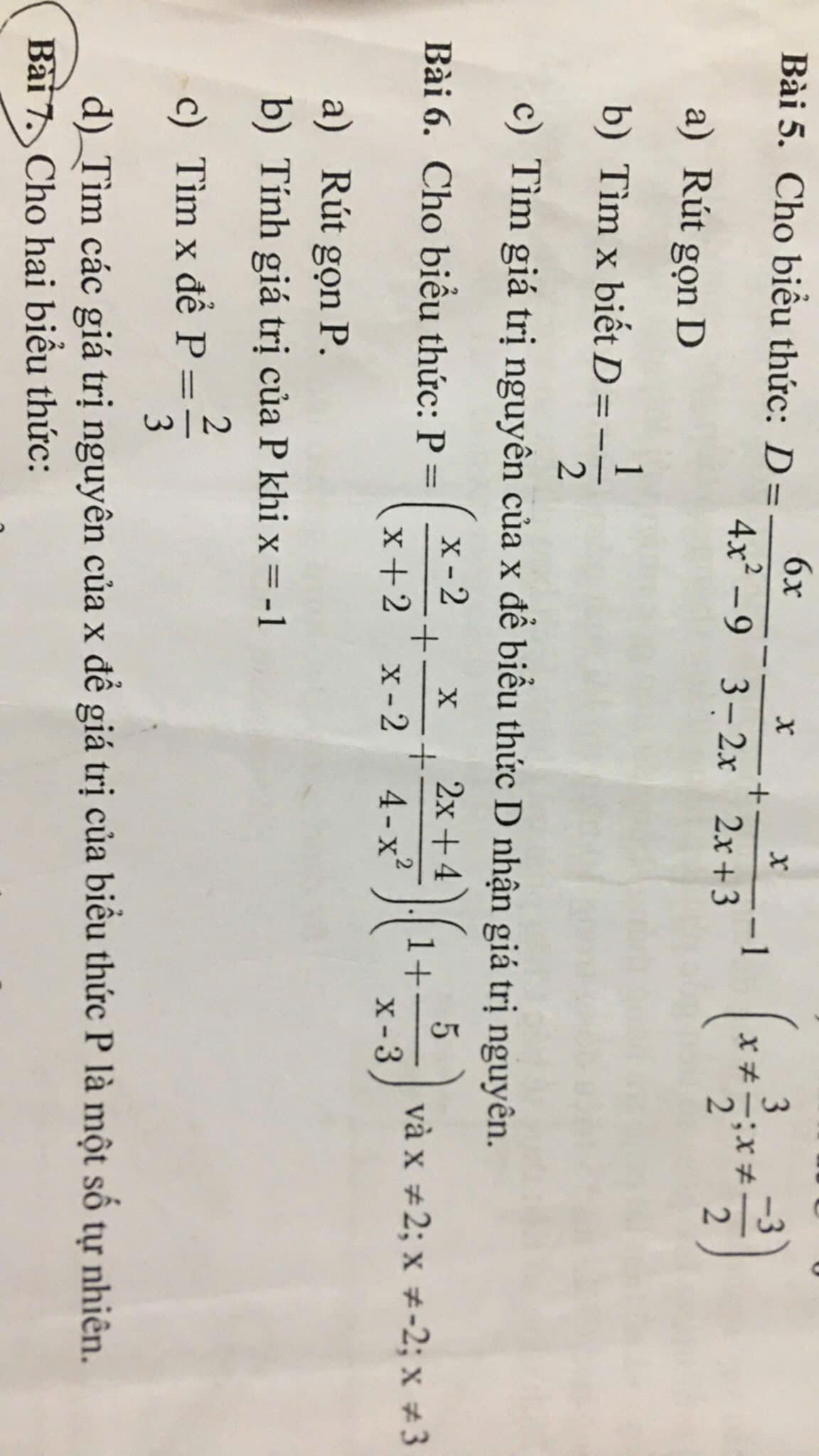chung minh 4(x+1)(2x+1)<=9(x+1)^2
Hãy nhập câu hỏi của bạn vào đây, nếu là tài khoản VIP, bạn sẽ được ưu tiên trả lời.


Bài 5:
a: \(D=\dfrac{6x}{4x^2-9}-\dfrac{x}{3-2x}+\dfrac{x}{2x+3}-1\)
\(=\dfrac{6x}{\left(2x-3\right)\left(2x+3\right)}+\dfrac{x}{2x-3}+\dfrac{x}{2x+3}-1\)
\(=\dfrac{6x+x\left(2x+3\right)+x\left(2x-3\right)-4x^2+9}{\left(2x-3\right)\left(2x+3\right)}\)
\(=\dfrac{6x+x\left(2x+3+2x-3\right)-4x^2+9}{\left(2x-3\right)\left(2x+3\right)}\)
\(=\dfrac{6x+9}{\left(2x-3\right)\left(2x+3\right)}=\dfrac{3}{2x-3}\)
b: \(D=-\dfrac{1}{2}\)
=>\(\dfrac{3}{2x-3}=-\dfrac{1}{2}\)
=>2x-3=-6
=>2x=-3
=>\(x=-\dfrac{3}{2}\left(loại\right)\)
c: Để D nguyên thì \(3⋮2x-3\)
=>\(2x-3\in\left\{1;-1;3;-3\right\}\)
=>\(x\in\left\{2;1;3;0\right\}\)
Bài 6:
a: \(P=\left(\dfrac{x-2}{x+2}+\dfrac{x}{x-2}+\dfrac{2x+4}{4-x^2}\right)\cdot\left(1+\dfrac{5}{x-3}\right)\)
\(=\left(\dfrac{x-2}{x+2}+\dfrac{x}{x-2}-\dfrac{2\left(x+2\right)}{\left(x+2\right)\left(x-2\right)}\right)\cdot\dfrac{x-3+5}{x-3}\)
\(=\left(\dfrac{x-2}{x+2}+\dfrac{x}{x-2}-\dfrac{2}{x-2}\right)\cdot\dfrac{x+2}{x-3}\)
\(=\left(\dfrac{x-2}{x+2}+1\right)\cdot\dfrac{x+2}{x-3}=\dfrac{x-2+x+2}{x+2}\cdot\dfrac{x+2}{x-3}=\dfrac{2x}{x-3}\)
b: Khi x=-1 thì \(P=\dfrac{2\cdot\left(-1\right)}{-1-3}=\dfrac{-2}{-4}=\dfrac{1}{2}\)
c: \(P=\dfrac{2}{3}\)
=>\(\dfrac{2x}{x-3}=\dfrac{2}{3}\)
=>\(\dfrac{x}{x-3}=\dfrac{1}{3}\)
=>3x=x-3
=>2x=-3
=>\(x=-\dfrac{3}{2}\)(nhận)
d: Để P là số tự nhiên thì \(\left\{{}\begin{matrix}2x⋮x-3\\\dfrac{2x}{x-3}>=0\end{matrix}\right.\Leftrightarrow\left\{{}\begin{matrix}2x-6+6⋮x-3\\\dfrac{x}{x-3}>=0\end{matrix}\right.\)
=>\(\left\{{}\begin{matrix}6⋮x-3\\\left[{}\begin{matrix}x>3\\x< =0\end{matrix}\right.\end{matrix}\right.\Leftrightarrow\left\{{}\begin{matrix}x-3\in\left\{1;-1;2;-2;3;-3;6;-6\right\}\\\left[{}\begin{matrix}x>3\\x< =0\end{matrix}\right.\end{matrix}\right.\)
=>\(x\in\left\{4;5;6;0;9;-3\right\}\)


Chắc em ghi đề sai
Nếu \(a+b+c=1\) thì \(\dfrac{a}{1+a^2}+\dfrac{b}{1+b^2}+\dfrac{c}{1+c^2}\le\dfrac{9}{10}\)
Còn \(a+b+c=3\) thì \(\dfrac{a}{1+a^2}+\dfrac{b}{1+b^2}+\dfrac{c}{1+c^2}\le\dfrac{3}{2}\)
Chứng minh BĐT dưới quá đơn giản chỉ bằng 1 dòng AM-Gm cho mẫu.
Còn BĐT trên thì sử dụng đánh giá (thông qua kĩ thuật UCT):
\(\dfrac{x}{1+x^2}\le\dfrac{36x+3}{50}\)
Nhân chéo quy đồng thì BĐT này tương đương:
\(\left(3x-1\right)^2\left(4x+3\right)\ge0\) (luôn đúng với x dương)
Áp dụng cho a;b;c rồi cộng vế là xong

Xét tứ giác BFHD có \(\widehat{BFH}+\widehat{BDH}=90^0+90^0=180^0\)
nên BFHD là tứ giác nội tiếp
Xét tứ giác CEHD có \(\widehat{CEH}+\widehat{CDH}=90^0+90^0=180^0\)
nên CEHD là tứ giác nội tiếp
Xét tứ giác AEHF có \(\widehat{AEH}+\widehat{AFH}=90^0+90^0=180^0\)
nên AEHF là tứ giác nội tiếp
Ta có: \(\widehat{FDH}=\widehat{FBH}\)(BFHD nội tiếp)
\(\widehat{EDH}=\widehat{ECH}\)(EHDC nội tiếp)
mà \(\widehat{FBH}=\widehat{ECH}\left(=90^0-\widehat{BAC}\right)\)
nên \(\widehat{FDH}=\widehat{EDH}\)
=>DH là phân giác của góc FDE
Ta có: \(\widehat{EFH}=\widehat{EAH}\)(AEHF nội tiếp)
\(\widehat{DFH}=\widehat{DBH}\)(BFHD nội tiếp)
mà \(\widehat{EAH}=\widehat{DBH}\left(=90^0-\widehat{ACD}\right)\)
nên \(\widehat{EFH}=\widehat{DFH}\)
=>FH là phân giác của góc EFD
Xét ΔEFD có
DH,FH là các đường phân giác
DH cắt FH tại H
Do đó: H là tâm đường tròn nội tiếp của ΔEFD
hay H cách đều ba cạnh của ΔEFD

a: Gọi I là giao điểm của AF và DM
Ta có: \(AE=EB=\dfrac{AB}{2}\)
\(DF=FC=\dfrac{DC}{2}\)
mà AB=DC(ABCD là hình vuông)
nên AE=EB=DF=FC
Xét tứ giác AECF có
AE//CF
AE=CF
Do đó: AECF là hình bình hành
=>AF//CE
mà DM\(\perp\)CE
nên DM\(\perp\)AF tại I
Xét ΔDMC có
F là trung điểm của DC
FI//MC
Do đó: I là trung điểm của DM
XétΔADM có
AI là đường cao
AI là đường trung tuyến
Do đó: ΔADM cân tại A

Gọi biểu thức cần tìm GTLN là P
Bunhiacopxki:
\(\left(x^2+y+z\right)\left(1+y+z\right)\ge\left(x+y+z\right)^2=9\)
\(\Rightarrow\dfrac{1}{x^2+y+z}\le\dfrac{1+y+z}{9}\)
Tương tự:
\(\dfrac{1}{y^2+x+z}\le\dfrac{1+x+z}{9}\)
\(\dfrac{1}{z^2+x+y}\le\dfrac{1+x+y}{9}\)
Cộng vế:
\(P\le\dfrac{1+y+z}{9}+\dfrac{1+x+z}{9}+\dfrac{1+x+y}{9}=1\)
Dấu "=" xảy ra khi \(x=y=z=1\)

\(Q=\dfrac{2024a}{ab+2024a+2024}+\dfrac{b}{bc+b+2024}+\dfrac{c}{ac+c+1}\)
\(=\dfrac{abc.a}{ab+abc.a+abc}+\dfrac{b}{bc+b+abc}+\dfrac{c}{ac+c+1}\)
\(=\dfrac{ac}{1+ac+c}+\dfrac{1}{c+1+ac}+\dfrac{c}{ac+c+1}\)
\(=\dfrac{ac+c+1}{ac+c+1}=1\)

Giải:
TH1: Nếu k = 1 thì 23k = 23.1 = 23 (thỏa mãn)
Nếu k \(\in\) N; k ≥ 2 thì 23k chia hết cho: 1; k; 23 (k > 1)
Vậy 23k là hợp số(loại)
Từ các lập luận trên ta có k = 1 là giá trị duy nhất thỏa mãn đề bài. Vậy k = 1 thì 23k là số nguyên tố.

a: Xét ΔOAD và ΔOEB có
\(\widehat{OAD}=\widehat{OEB}\)(hai góc so le trong, AD//BE)
\(\widehat{AOD}=\widehat{BOE}\)(hai góc đối đỉnh)
Do đó: ΔOAD~ΔOEB
=>\(\dfrac{OA}{OE}=\dfrac{OD}{OB}\)(1)
Xét ΔOAF và ΔOCB có
\(\widehat{OAF}=\widehat{OCB}\)(hai góc so le trong, AF//BC)
\(\widehat{AOF}=\widehat{COB}\)(hai góc đối đỉnh)
Do đó:ΔOAF~ΔOCB
=>\(\dfrac{OA}{OC}=\dfrac{OF}{OB}\)
=>\(\dfrac{OB}{OF}=\dfrac{OC}{OA}\)(2)
Xét ΔOAB và ΔOCD có
\(\widehat{OAB}=\widehat{OCD}\)(hai góc so le trong, AB//CD)
\(\widehat{AOB}=\widehat{COD}\)(hai góc đối đỉnh)
Do đó: ΔOAB~ΔOCD
=>\(\dfrac{OC}{OA}=\dfrac{OD}{OB}\left(3\right)\)
Từ (1),(2),(3) suy ra \(\dfrac{OB}{OF}=\dfrac{OA}{OE}\)
Xét ΔOBA và ΔOFE có
\(\dfrac{OB}{OF}=\dfrac{OA}{OE};\widehat{AOB}=\widehat{EOF}\)
Do đó: ΔOBA~ΔOFE
=>\(\widehat{OBA}=\widehat{OEF}\)
=>BA//EF
